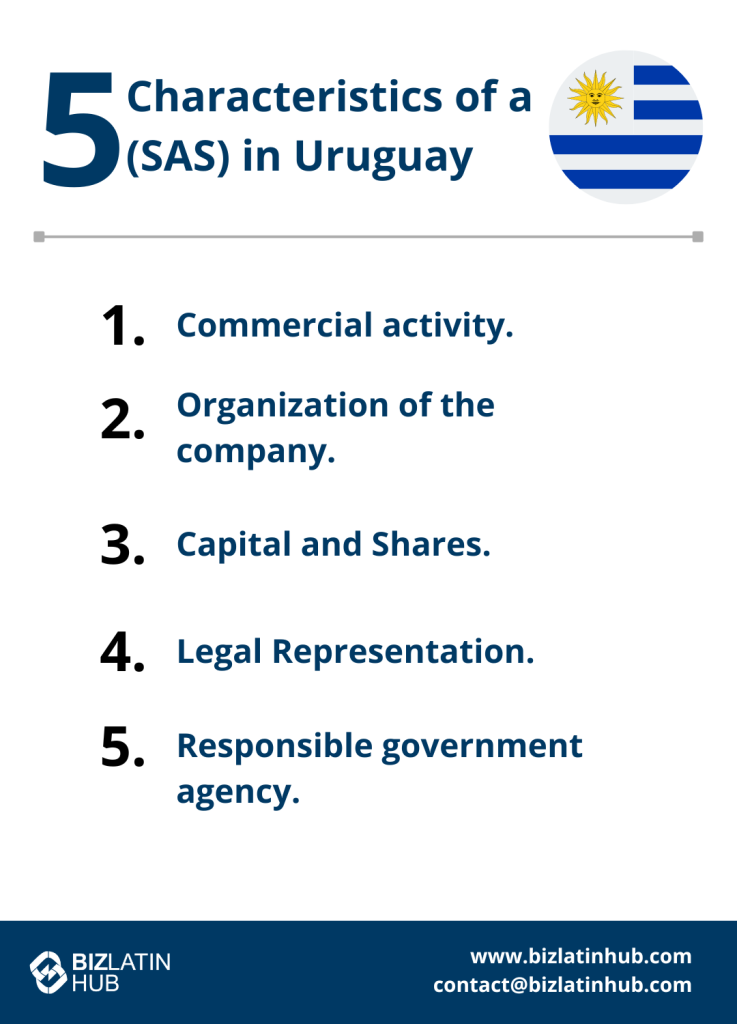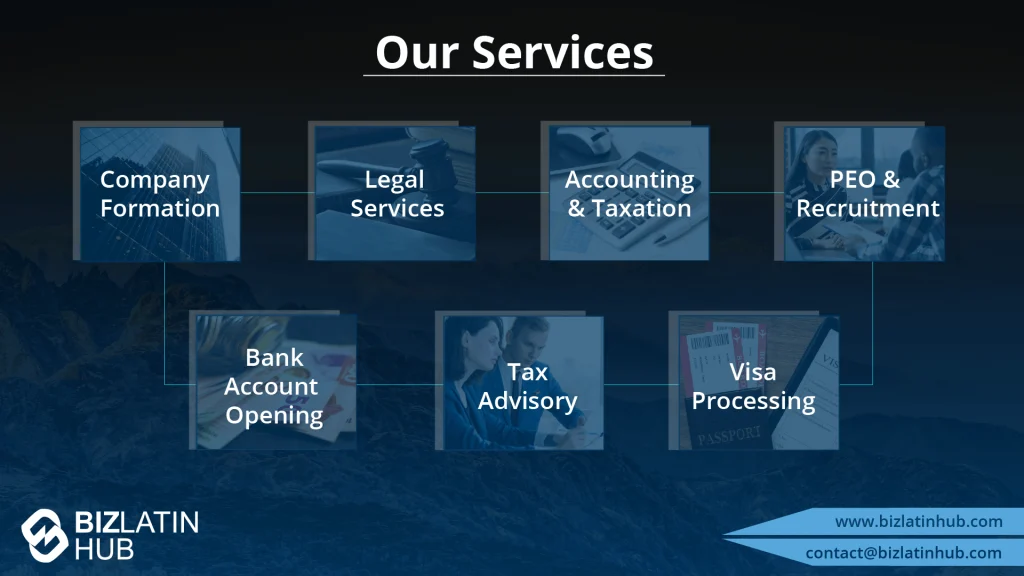Discover the Simplified Joint Stock Company or SAS in Uruguay, and understand how it presents an attractive option for foreign executives looking to expand in this developing country. For years, entrepreneurs have advocated for more sophisticated tools to boost business activity in Uruguay. Despite steady GDP growth since 2003, certain limitations persisted that hindered the advancement of Uruguay’s business and commercial framework. With the introduction of the SAS in Uruguay, a more agile and accessible business structure has emerged, offering foreign executives an attractive avenue for registering a company in Uruguay. By understanding the characteristics of the SAS in Uruguay, foreign entrepreneurs can take advantage of this innovative legal framework to navigate the complexities of the Uruguayan business landscape and capitalize on the country’s economic potential.
On 11 September 2019, the government passed the Entrepreneurs Act. This piece of legislation promotes the development of the country’s entrepreneurial culture. One key development was the introduction of the SAS in Uruguay.

What are the Benefits of a SAS in Uruguay?
The new business structure, the SAS in Uruguay, seeks to:
- Minimize costs of incorporating a company in Uruguay.
- Speed up the processing time to formally establish a commercial entity.
- Highlight the inclusion of standards that allow the use of existing technological tools in all its phases (constitution, development and statutory reforms).
Law 19820, the Law of Commercial Companies (Ley de Sociedades Comerciales – LSC) outlines the characteristics and requirements of forming and operating an SAS in Uruguay.
5 Characteristics of the Simplified Stock Company (SAS)
In Uruguay, the new SAS structure may be constituted by one or more natural or legal persons, except for a company with the Sociedad Anónima legal structure (Limited Liability Company). Its legal status and assets are independent of business owners, reducing personal liability for company activities.
- Commercial activity.
- Organization of the company.
- Capital and Shares.
- Legal Representation.
- Responsible government agency.
Notably, in creating this entity, the government recognized the need for a digital constitution process, to make incorporation easier for entrepreneurs.
The bylaws may restrict and even prohibit the negotiation of the shares (term: 10 years), being recorded on the back of the registered shares and in the Registry Book of Nominative Securities or in the Registry Book of Scriptural Shares.
Individuals and other legal entities may not establish an SAS in Uruguay in the following circumstances:
- If the company plans to make public offers of their shares.
- If the State, a government department, an autonomous entity, a decentralized service
provider, or a non-state public person are the shareholders either directly or
indirectly. - If the desired activities of the company are mandated by law to be carried out
under a specific legal entity type.
1. Commercial Activity
The SAS may carry out any commercial or civil activity provided they are not prohibited by law, or that the particular activity is required by law to be carried out under a specific legal entity type of those provided for in the LSC (such as insurance or financial activity).
2. Organization of the Company
The law grants broad freedoms for members to establish the way in which the SAS in Uruguay is organized. This is a significant difference with respect to the Sociedad Anónima, which is less flexible in terms of required governance mechanisms under the LSC.
With this freedom that is given to SAS, business owners can adopt the figure of an administrator, that of a board of directors or any other form of action that the partners determine.

On subscription and integration, the law provides that the capital of the SAS in Uruguay must be fully subscribed or integrated at the time of incorporating the company.
A minimum of 10% of the share capital must be integrated if the integration is made in money, or 100% if it is carried out in kind.
The total integration of the shares must be done within 24 months of the constitution.
4. Legal Representation
Legal representation may be exercised by one or more natural or legal persons and its designation may be statutory or resolved by the assembly or the sole shareholder.
When the designation is not statutory, the appointment of the legal representative must be registered in the Commercial Registry in compliance with Law 17.904 and Article 86 of the LSC.
The legal representative has the broadest powers and functions of administration and representation of the company, being able to perform all social businesses, acts, and contracts that are not notoriously foreign to the corporate purpose.
For the first time, Uruguayan legislation allows social bodies to hold meetings in person or by any other reliable means of simultaneous communication such as video calling.
The method used to carry out this meeting or assembly must be recorded in the minutes to be prepared. The idea of this freedom is that those involved can hold meetings from abroad or different locations, as long as they can reliably exchange ideas and make necessary decisions.
Additionally, article 24 allows the adoption of resolutions of the social bodies by written consent (which may also be communicated by electronic means) and without the need to hold meetings.
5. Responsible Government Agency
The law in its article 10 establishes that the National Internal Audit agency (Auditoría Interna de la Nación – AIN) will be the state control body for those SAS cases whose income at the end of the year exceeds 37,500,000 IU (approximately USD 4,500,000).
The Agency of Electronic Government and Information and Knowledge Society (Agencia de Gobierno Electrónico y Sociedad de la Información y del Conocimiento – AGESIC) manages the new digital procedure to form your SAS in Uruguay. However, you must also register the company with the National Registry of Commerce (Registro Nacional de Comercio), who must qualify your company registration within 24 hours.
Can I Changing your legal entity to an SAS structure?
In principle, any commercial company (except the SA) may be converted into an SAS structure. Business owners must produce a resolution adopted by its partners or shareholders in an assembly or meeting by the majority outlined by law or by the company’s bylaws.
The law provides that a sole proprietorship can be transformed into SAS.
In the same sense, the SAS can be transformed into a commercial company of those outlined in the LSC, respecting the majorities and requirements established in the Law.
Other Considerations When Forming a SAS in Uruguay
The shareholders will be responsible only up to the amount of the respective contributions corresponding to the integration of the shares they subscribe or acquire; unless you declare the legal personality of the company unenforceable (Art. 189, LSC).
Shareholders will be liable for labor obligations up to their respective contributions.
The SAS has a big disadvantage, which is the social contributions paid by its administrator, equivalent to a minimum of approximately USD$ 250 when the company has no employees and the higher salary of its employees when it has them.
There is no required life expectancy for the SAS entity in Uruguay. Furthermore, the AIN does not need to intervene in any modification of the company’s statutes.
Entrepreneurs forming this Simplified Stock Company in Uruguay must ensure that their documentation and company activities adhere to all requirements under the Law of Financial Inclusion and (Law 19.210) and the Comprehensive Law against Money Laundering (Law 19.574).
For this process, it’s highly recommended that entrepreneurs seek out the advice and assistance from experienced legal and accounting specialists in Uruguay.
Expand your business through an SAS in Uruguay
New laws introduced by the Uruguayan government make more room for commercial flexibility and digital activity in business. Entrepreneurs expanding to Uruguay now have another option to do business in the country with limited liability and a more agile governance structure with the SAS in Uruguay.
To get started, be sure to work with knowledgeable, experienced legal and accounting experts who can guide you through the company formation process and support your ongoing operations in full compliance with local law.
At Biz Latin Hub, our team of qualified professionals offers a full range of market entry and back-office services to support foreign executives’ expansion into Latin America. Reach out to our Uruguayan legal and accounting teams here at Biz Latin Hub for customized corporate secretarial support for your business.
Learn more about our team and expert authors.






